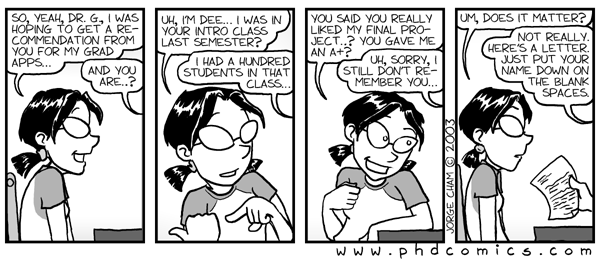
Need a letter of recommendation?*
For Whom I will Write Letters:
Actually, it is clearer for whom I will not write letters.
If you were in one of my really big classes (100 students or more), you cannot expect a very good (that is, detailed, personalized letter). So, to be clear, I will NOT be writing a letter for you if you took my 600 student course (Poli 244) [This is a change in policy]. If you took a smaller class that still had a TA, then submit the materials below to your TA. They will write the letter and then send me both the draft and the materials. BUT this only works if you give the TA time and if you ask within a reasonable time (6 months or so) of the class since the TA will not remember you for years nor will they be around forever.
If you did poorly in my class (B- or worse). It is better to get a letter from someone else than a mediocre one from me. This should be obvious, but ....
Those who need instant responses (see below). Writing letters of recommendation is only one part of my job--I simply cannot drop everything else that I am doing to write a letter. Since most programs want the letters to evaluate the student's maturity and organizational ability, asking or demanding an instant letter is probably not a good idea.
One other note: markets have shifted so choosing law school or graduate school should only be the decision of someone with a passionate interest and very high ability. Other folks will be wasting time and money, as neither option is a good way to delay entry into the job market.
Conditions To Which You Agree
1. You will complete fully all factual parts of any required forms (there are limits to this for web-based forms, of course).
1a. I will only write eight letters for you in a given year. Each one takes time.
2. You will waste your time printing my name, title, etc., rather than count on me to waste my time. Check out the forms; they often call for my printed or typed name, title, name of institution, phone number etc. YOU will complete this factual material as well. Your failure to do this may cause a delay that affects you adversely.
I will not fax letters for you. If you give me the stuff too late for it to go through the mail, you are out of luck.
3. Every form will be attached to a pre-addressed envelope unless it is an online process. And, yes, I now prefer online recommendations.
4. In so far as possible, you will send me all the forms and all the requests at once--in print (not email and not email attachments--getting all of the paper together means that less gets lost). You should give me at least two weeks to write the letters.
5. You will provide me with a typed list of 3-5 adjectives or adjectival phrases that capture some of your distinctive strengths, specifically those that I've seen and that you think THEY want to hear about.6. For each of these "strengths," you also will provide me with a brief anecdote that illustrates that particular strength; this example also should be something I observed in our work together (or plausibly could have observed).
7. Again, if you were a student in one of my large classes (one in which there was a TA), you should give all of the stuff to your TA since I probably do not know you. The TA will write the first draft of the letter and then send it to me along with the materials you gave them. I then revise and print out and mail. This means more time needed to complete the process--more advance notice is obviously required for these situations. For students in such large classes, you should seek letters from other profs who know you better.
8. You will email me a heads-up email, alerting me to the need to get your letters out, EXACTLY 3 days before they need to go into a regular delivery mail box.
By the way and just in case the above conditions sound burdensome, this is an effort at both burden-sharing and efficiency. The less time I have to spend on administrivia, the more care I can take writing a decent letter.
Please let me know what happens with your applications. The information is useful for the next generation, plus I am curious about what happens.
* Much of the text above was lifted from Prof. Paul Dawson's website. One of my big regrets from my Oberlin experience was not taking any of his classes.